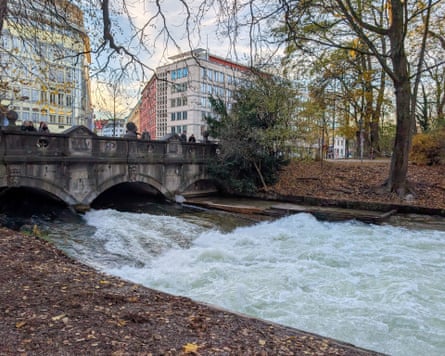The “mother of all river waves” in a German canal that is often credited as the birthplace of freshwater surfing has mysteriously disappeared after decades of flowing smoothly, leaving enthusiasts dumbfounded.
The famous stationary wave in the southern city of Munich is known as the Eisbach, or “ice brook”, for its frigid temperatures, and has become a pilgrimage site for surfers worldwide.
Unlike ocean surfing, its freshwater cousin takes place on a “standing wave”, which is often human-made, with currents often flowing over a concrete slab that manipulates the water into a permanent wave.
The sport’s origin is often cited as dating back to the early 1970s, when rule-breaking daredevils rode the naturally forming wave in Munich for the first time.
Today, river surfing has a global following, including in the River Severn in the United Kingdom, where surfers ride tidal bores, a phenomenon in which incoming tides form waves that move up a river.
In Hawaii, surfers also make river waves by digging a trench between a river and the ocean, with water flowing violently over the sand.
The Eisbach wave was originally believed to be formed by gravel, but the Munich surfing community later installed wooden planks that helped artificially stabilise the wave. Over the decades, it has become a major tourist draw for Bavaria’s state capital.
Largest during the winter months – when ice melt can push the wave up to one metre high – the river is now officially managed, including being drained once a year to clean away debris and inspect the streambed.

But after torrents were released back into the canal following its cleanup on Friday, the Eisbach wave did not form as usual, instead leaving unstable white water rapids.
“We’re at a loss,” surfer Klaus Rudolf told Stern magazine. “I was standing at the edge with my board on Friday evening and couldn’t believe it.”
Authorities were looking into the cause of the wave’s disappearance, including whether it could be due to the cleaning or a lack of water.
“No structural changes were made to the Eisbach wave or its banks during the cleanup,” the city said. An inspection of the site on Monday also did not reveal any damage.
On Tuesday, Mayor Dieter Reiter said in a statement that the city administration was “working with the Water Management Office and surfers to find a quick solution so that the famous surf wave will soon be available again as usual”.
Officials now plan to divert more water into the canal in hopes of a reappearance of the Eisbach, which SurferToday.com describes as “the mother of all river waves”. Standing waves require delicately balanced water levels and speeds.
The Eisbach wave closed earlier this year for several months after the death of a 33-year-old Munich woman who became trapped under the surface at night. Since it reopened, new rules have banned night-time surfing.
Agence France-Presse contributed to this report
Disclaimer : This story is auto aggregated by a computer programme and has not been created or edited by DOWNTHENEWS. Publisher: theguardian.com





